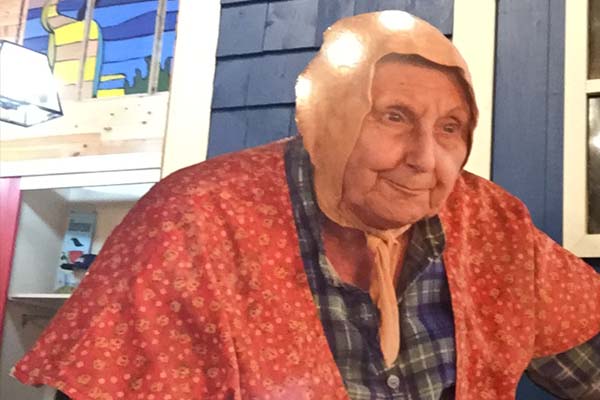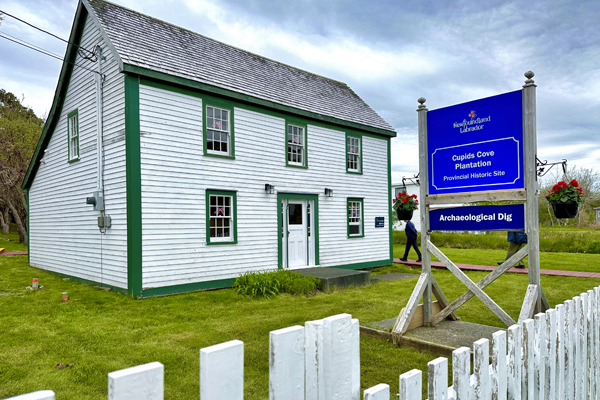A visit to Pays de la Sagouine
Most authors consider time on a bestseller list the peak of success. Imagine an author with an entire theme park dedicated to just one of her characters. That’s exactly what I find at Pays de la Sagouine or The Country of the Washerwoman in Bouctouche on New Brunswick’s Acadian coast.
When I walk into the reception centre, I find a life size cutout of la Sagouine, the washerwoman with the gift of the gab. La Sagouine kneels beside her only possessions, a pail and a mop. An empty rocking chair beside her beckons visitors. I sit and have my picture taken with the fictional character who became the most important cultural icon for the Acadian people.
Almost from the birth of la Sagouine, when author Antonine Maillet published a book of monologues in 1971, Viola Léger took on the role. She played the washerwoman for nearly 50 years here at the park and around the world. She took the stage by storm, musing on subjects as varied as Christmas and lotteries, war and the census, space travel and death—always grounded in the experience of a simple Acadian woman, and always delivered with a cutting wit spoken in the local dialect.
In fact, la Sagouine was the first character ever to speak in the distinctive Acadian tongue. Her voice awakened an entire nation and started a cultural revolution that reverberates half a century later. As Maillet writes of her character in the preface to her book, “She speaks the language of her father and grandfathers .... She’s not aware that she’s her own dictionary, her own race.”

Some of the structures and buildings at the Land of the Washerwoman.
Now retired, Viola Léger is the only actor who ever played the role. Park management hasn’t yet had the heart to replace her. Other actors who play dozens of other Maillet characters have stepped up to entertain and delight visitors.
Exiting through the back of the reception centre, I emerge onto the grounds to meet some of these characters. There’s an observation tower overlooking the Bouctouche River, buildings where performances take place and an open-air amphitheatre for big, outdoor shows.
After taking in a short performance that finishes with a catchy, traditional Acadian song, I follow a boardwalk that meanders gracefully across the river to a tiny island. There, I wander in and out of colourful, almost cartoonish buildings reminiscent of traditional Acadian homes. Actors and interpreters in period costume tell stories, sing, dance and play music, all in the roles of Maillet characters like Thaddée, Walkalone and Dorine.
Irene Maillet-Belley, in the role of the fiery Dorine, offers me a sample of poutine râpée —the traditional Acadian potato dumpling stuffed with pork. She tells me the dish is nicknamed nun’s farts. I have a good laugh, but Dorine goes on to explain the historic roots and importance of Acadian foods.
“When we came back after the expulsion, they wanted our fertile land,” she says, referring to le Grand Dérangement or deportation of the Acadians by British forces in the period 1755 to 1763. “They gave us rocky and sandy land along the shoreline. That’s why we became fishermen. Potatoes grow well there. That’s why potatoes are a big part of our traditional food.”
From scarcity, generosity is born. “That’s the Acadian way,” she says. “If you come over to my parents’ house, they would say, ‘Make yourself at home. Serve yourself. Go to the fridge. If there’s anything there you like, just take it.’”
Samples of other traditional dishes are passed around, such as slices of rappie pie (another potato-based Acadian favourite), served with a puddle of molasses for dipping. I’m reminded of the other rib-sticking comfort foods I’ve seen on menus all along this coast such as crêpes râpée and tartes aux coques or clam pie. Except for the clams, wild meats such as venison, moose and rabbit have been replaced in traditional dishes by pork and chicken.
Slipping out of character just for a moment, Maillet-Belley reflects on the importance of Dorine and all the other characters who come to life in the park. “Just working here for 22 years, representing l’Acadie around the world, is the most important thing to me. I am an Acadian in my heart and in my blood; proud of who I am.”
As Dorine, she’s had the opportunity to share that pride with thousands who visit the park every year—more than 1.5 million since it opened in 1992. Some of these encounters have led to moments of fame for Maillet-Belley as Dorine. She’s played spoons with Camilla Bowles when she and Prince Charles visited New Brunswick, and she’s taught members of the Stanley Cup winning Pittsburgh Penguins how to eat lobster the Acadian way.
For her work, author Antonine Maillet has won major awards at home and abroad, including two Governor General’s Awards, the Order of Canada, and in 1979 the Prix Goncourt, France’s literary award for “the best and most imaginative prose work of the year.” She was the first non-European recipient. These accolades are all the more astonishing for the types of characters she created and for her subject matter—previously neglected working-class Acadian culture and history.
As a fitting end to my Acadian tasting experience, Dorine hands around shots of la flacatoune bagosse. It’s the legal version of traditional Acadian moonshine made with a blend of lemon rum, apple juice and vanilla syrup, but it goes down easy. The original was a drink flavoured with wild berries and made of—what else—fermented potatoes.



